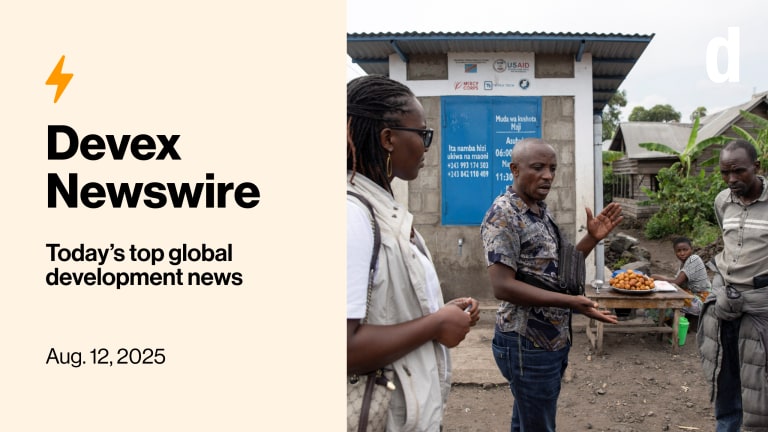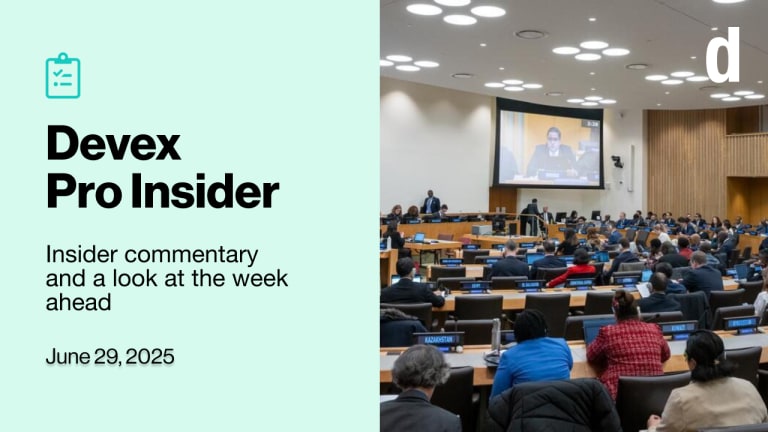
WASHINGTON — After nearly three decades at the United States Agency for International Development, serving in a variety of positions including acting administrator, Wade Warren left with much fanfare and recently started a new job at Deloitte Consulting.
Warren’s farewell party brought together USAID bureaus in a baking contest (he has a sweet tooth), and his time at the agency drew much praise from his colleagues, including USAID Administrator Mark Green, who called him a “walking encyclopedia of the agency.”
“I’m very sorry to see Wade go. And we'll look for ways to drag him back in here kicking and screaming,” Green said, adding that Warren was “incredibly valuable” in helping him understand the agency and its challenges.
It's really important for an aid agency like USAID to begin to see a big part of what it does as a catalyst for mobilizing additional resources.”
— Wade Warren, former USAID acting administratorIn his 27 years at USAID, Warren served in missions in Zimbabwe and Botswana and held senior management positions in the Bureau for Policy, Planning and Learn, and the Bureau for Global Health before serving as acting administrator for about seven months until Green’s confirmation. In those years, he’s made big decisions, been in leadership during crises, and learned to navigate a complex bureaucracy.
Warren sat down with Devex just before his departure to share his insights and some of the lessons he learned along the way. Here is that conversation, edited for length and clarity.
What was your greatest accomplishment in your years at USAID?
The hardest thing that I worked on that ultimately had a good outcome — but it wasn't clear at the outset that we were going to be successful — was the response to Ebola. I was in the Global Health Bureau at the time. In retrospect you can see that we did some things right to eventually help the countries get the disease under control, but there were times in the thick of it where we'd never seen anything like that before, and neither the agency, nor CDC, nor other members of the interagency knew exactly what to do, and whether what we were doing was going to be effective or not. So that was a challenging time. I don't know if that would be the greatest accomplishment, but it was certainly one of the most memorable and notable things that I worked on.
What do you think you got right, and what would you do differently in retrospect?
We were figuring it out as we went along. I think one thing that we got right was recognizing that we had to fight the disease at the community level, and that people had to trust us and their governments enough to give their loved ones over for treatment and to be willing to provide samples, and get those samples analyzed so we would know what was actually going on. And there was also much fear at the time that I think using all of our implementing partners in our networks at the community level really helped us get all the way to the disease where it is — where we need to be to stop it.
What is the biggest failure you saw at USAID during your tenure?
I don't know that I have a good answer to that question. I know that there have been some challenges structurally and institutionally in the interagency that we had to grapple with over the years that I was at USAID. And I think on many of them, we’re in the right place now — but it took us a while to figure out. I'll give you an example: USAID kind of operated on its own, the interagency didn't pay a lot of attention to us, and then in the 1990s, a lot of other agencies started working overseas and there were questions in the agency at the time about how do we deal with the rest of the interagency. And “wouldn’t everything be just great if people would go away and leave us alone.”
“The U.S. government is actually stronger if the whole resources and expertise of the interagency are brought to bear. [USAID] is an important part of that, but we're not the only part.”
—It took us a while as an agency to come to understand that that's not the world that we live in and that the U.S. government is actually stronger if the whole resources and expertise of the interagency are brought to bear and that we are an important part of that, but we're not the only part. We need to do our share in an interagency effort to resolve problems.
Going back to Ebola — we worked very well with CDC during the Ebola crisis, and I think if it had come 20 years earlier when we were less used to working in the interagency we would have struggled more.
If there was one thing you could change internally about how the agency works or functions, what would it be?
I think we have some self-imposed bureaucratic steps that we go through that are cumbersome in some ways and we're constantly looking for ways to clear them out and be more streamlined. I think I've seen instances where something went wrong with a particular project or process, and so someone overengineered a fix and then applied it across everything the agency does. And then a few years later, somebody has to come along and try to clean it out because it's getting us clogged up. So I would just say trying to be more streamlined and less bureaucratic in the way we manage money and manage people and get our work done.
One of the big problems identified in the past year has been the dramatically poor performance of the global health supply chain contract, the largest USAID award in history. You helped oversee the award process. Do you think the way the contract was awarded was a mistake? What would you do differently?
No, I don't. We did years’ worth of study on the previous supply chain contracts, of which there were several. They were hard to manage and overlapping and duplicative in some ways. So I think it was a thoughtful design to the new contract. But what the concern is — and the administrator’s made no secret about this — is the performance of the awardee. He has made it clear that it is unacceptable and that he wants to see dramatic and immediate improvement and we have seen improvement. I really don’t think the fault is in the design of the project or the way that it was awarded.
What can you tell us about the redesign efforts?
Green is trying to elevate the way we deliver humanitarian assistance. He's trying to more closely link strategic planning, budgeting, and performance management. He's trying to make sure the technical lessons learned in one region or one sector get shared with other regions and other sectors. So I think all of the changes that he wants to institute are just going to make the agency stronger and people will feel good about that once they can see it all laid out on a piece of paper and understand where they fit in individually. It's very explicitly not about reducing staff, but will shift staff around.
One area Green said he wants to focus more on in his role is domestic resource mobilization. What can you tell us about that strategy?
It's a very exciting idea, and it's not new really, but it's something that's got a lot of attention from the administrator and from this administration and for all kinds of good reasons. I think it's really important for an aid agency like USAID to begin to see a big part of what it does as a catalyst for mobilizing these additional resources. The administration talks all the time about this journey to self-reliance and that you're never going to get to self-reliance unless you can also get to a place where you can self-finance. So using our resources as a way to get countries closer to that day is exciting and the right thing to do. It includes working with the private sector, doing tax reform and tax reallocation projects, so the countries can manage their own money better. And I just think it's the future of the agency.
What other big issues do you think should be part of USAID strategy moving forward?
I alluded to one of them already, which is the interagency nature of our work. I think that's here to stay; it's a good thing. We're stronger as a whole of government than we are as any one individual agency, but there has definitely been a trend over time from isolated agency actions to a more concerted whole-of-government approach, and I think that's great. Another big trend is around aid as a catalyst and mobilizing other sorts of resources to help get the job done. And I think that's going to be increasingly important.
“When we recruit new foreign service officers, we need to be very clear with them that a big portion of their career may be serving difficult environments. And it's not your father's aid agency.”
—Then the last one that I have seen over the past couple decades is an increasing portion of the agency's work is done in crisis and post-crisis countries. That requires different contracting mechanisms, different training for our staff, different security postures in the field, different ways of implementing and monitoring projects when you can't get to where they are sometimes because of security. So the whole agency is of necessity orienting itself more around programming in these non-permissive environments and in crisis situations. And unfortunately for the world, I don't see a big change in that when you look ahead.
I don't know if it will affect the balance between contractors and direct hires, but for everyone having the additional cost and the additional burdens of the security overlay to make sure that your people are safe while they're delivering programming is just a different way of working, a different way of thinking. I think when we recruit new foreign service officers, we need to probably be very clear with them that a big portion of their career may be serving in these kinds of difficult environments. And it's not your father's aid agency.








